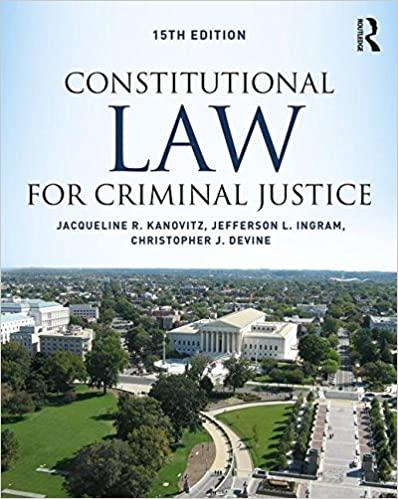Question
Write a reply to this post: The model rules discussed in this week's reading govern how an attorney interacts with his clients and third parties.
Write a reply to this post: The model rules discussed in this week's reading govern how an attorney interacts with his clients and third parties. These rules require the lawyer to render candid advice to the client (Rule 2.1), advocate in an unbiased manner when in a non adjudicative setting (Rule 3.9), and communicate with truthfulness and respect to non-clients (Rules 4.1- 4.4). Rule 3.2 states that "a lawyer shall make reasonable efforts to expedite litigation consistent with the interests of the client" (ABA, 2020). Expediting litigation is important because it saves the client money, time, and other resources they may be giving up during a representative proceeding. As demonstrated in the case of Attorney Grievance Commission v. Trye, Rule 3.2 can be violated when the respondent displays behavior such as non-compliance with discovery requests or refusal to show up for a court-ordered hearing (Lewinbuk, p. 252). Jesus reminds his listeners in Matthew 5:25 to "settle matters quickly with your adversary who is taking you to court." The ethical attorney should do the same rather than prolonging proceedings for the sake of obtaining more legal fees. Candor toward the tribunal is expressed in Model Rule 3.3(a), which states in part "a lawyer shall not knowingly make a false statement of fact or law to a tribunal" (ABA 2020). Again using the Trye case as an example, the respondent lied to the judge and made misrepresentations knowingly during her divorce proceedings (Lewinbuk, p. 253). Regent University's discussion describes the Biblical implications best, referencing 1 Peter 4:5. Their advice suggests, "Christian attorneys should deal with the tribunal as if they were giving an 'account to Him who is ready to judge the living and the dead.'"(Gantt et. al, p. 48). Regarding meritorious claims and contentions, Rule 3.1 guides the attorney in an advocate role by steering the attorney away from arguments lacking a good faith claim. It also requires the attorney to avoid starting a proceeding unless there is "a basis in law and fact for doing so that is not frivolous" (ABA, 2020). A meritorious claim is a legal action made in good faith, so when an attorney violates Rule 3.1, the attorney is pursuing a case that has no solid legal basis. In the In Re Johnson case, the attorney assisted a client with a bankruptcy claim for an eighteen year old girl who had no debt or assets, and was part of a fraud scheme set up by her grandparents (Lewinbuk, p. 257). Despite the attorney's knowledge that the bankruptcy claim was part of a fraud and had no legal basis, he proceeded with the case. The words of Paul in Philippians 4:8 serve as a reminder that the ethical attorney should pursue "whatever things are true."
Lewinbuk, K. P. 2019.Connecting Ethics and Practice: A Lawyer's Guide to Professional Responsibility.New York, NY: Wolters Kluwer.
Step by Step Solution
There are 3 Steps involved in it
Step: 1

Get Instant Access to Expert-Tailored Solutions
See step-by-step solutions with expert insights and AI powered tools for academic success
Step: 2

Step: 3

Ace Your Homework with AI
Get the answers you need in no time with our AI-driven, step-by-step assistance
Get Started


